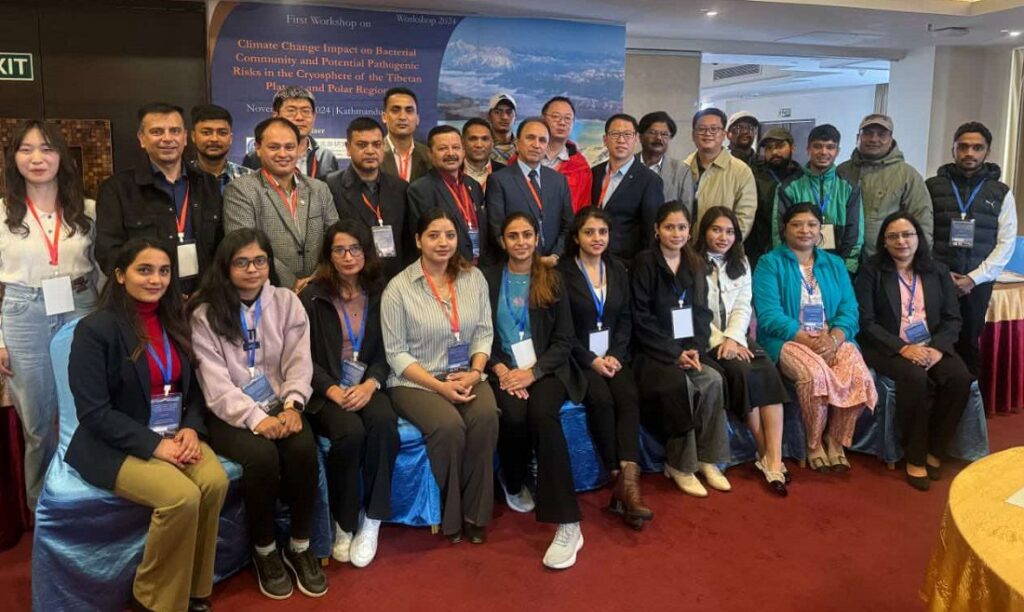The World Antimicrobial Resistance (AMR) Awareness Week 2024 is a global campaign to raise awareness and understanding of AMR and promote best practices to reduce the emergence and spread of drug-resistant infections.
This is celebrated from 18-24 November every year. Considering the significance of the awareness week and delivering scientific knowledge via academician to society, a one-day Alliance of International Science Organization (ANSO) workshop in 2024 under the subject “Climate change impact on bacterial community and potential pathogenic risks in the cryosphere of the Tibetan Plateau and polar regions” was organized at Kathmandu.
The workshop featured ten main presentations and two technical sessions. Thirty-five participants attended the program on behalf of universities and government research centers from Nepal and China.
The event was attended by the Academic head (Rector) of the Tribhuvan University of Nepal Prof. Khadga KC, who called on greater urgency for regional and global collaboration among universities, stakeholders, and the government to combat climate change issues and AMR in the cryosphere and polar regions.
Addressing the event, the academic head said that Tribhuvan University will collaborate and work together more in the diverse fields in the international platform to find solutions to combat the climate crisis. Moreover, he was glad to mention that Tribhuvan University is a permanent member of ANSO.
The project is led by Prof. Yongqin Liu of the Institute of Tibetan Plateau Research, Chinese Academy of Sciences. Several researchers from China (Institute of Tibetan Plateau Research Chinese Academy of Sciences and Lanzhou University) and outside (Montana State University, United States, Aarhus University, Denmark, and Tribhuvan University, Nepal) have collaborated in this multinational initiative. AMR is an increasingly serious threat to global public health that requires action across all government sectors and society posing a threat to everyone, everywhere.
Prof. Yongqin Liu delineates the importance of the Antarctic, Arctic, and Third Pole and climate studies.
The scientists Prof. Prakash Ghimire, Komal Raj Rijal, Dev Raj Joshi, and Reshma Tuladhar delivered studies of bacteria, viruses, and antibiotic resistance in the context of Nepal.
Similarly, Scientists from Lanzhou University, Prof. Mukan Ji, Pengfei Liu, and Guannan Mao shared findings of AMR and viruses in the Tibetan Plateau and Polar regions. Further, they make clear about the future collaboration of the Trans-Himalayan region.
This workshop aims to understand the role of microorganisms in maintaining glaciers and permafrost ecosystems and evaluate the potential microbiological risks of virulence factor genes and anti-bacterial resistance genes under global climate change.
This will help consolidate the security of the polar cryosphere ecosystem to meet the challenges brought by global climate change to human health, food security, and ecosystems.
In conclusion, the workshop explored the knowledge of the diversity and function of microbes in glaciers of the three poles.
It evaluated the potential risks of antibiotic-resistant pathogens that support future studies, as well as co-design and carry out interdisciplinary collaborative research.
The workshop was coordinated by Dr. Namita Paudel Adhikari and Dr. Guannan Mao from Nepal and China sides, respectively, which sustains scientists in a single platform for future research work in the Trans-Himalayan region.

MORE NEWS
Young leadership in choice, Saugat wins with respectable votes
Baglung flood: Three killed as flood sweeps away motorcycle and scooter
‘Youth in slogans many times, Youth in leadership this time’ – Saugat Thapa [Video]
Gandaki minister Deepak Manange resigns after ministry transfer